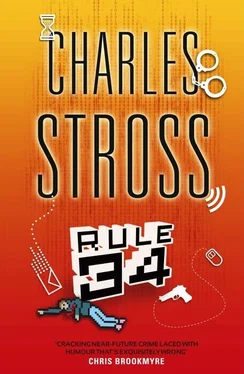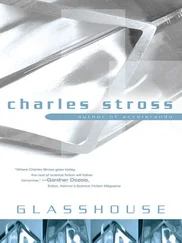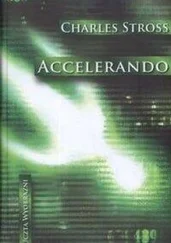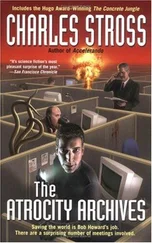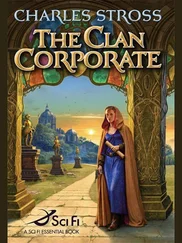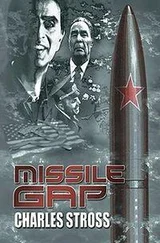Deprived of responsibility for the moment, you take the opportunity to walk around the table, showing Kemal how the investigation is set up—every police force does things differently. He nods appreciatively and asks sensible questions as you discreetly bring yourself up to speed. The Crolla scene is just as bizarre as the Blair bathroom. Here: a mattress stuffed with long-withdrawn one-pound notes that were cancelled more than a decade ago, even before the Euro switch-over. There: a woman’s body, still wearing a business suit, shrink-wrapped onto the mattress with industrial-strength plastic sheeting. Preliminary pathology report: cause of death, anaphylactic shock—victim unconscious prior to death. The occlusive layer alone wasn’t fatal, and there’s no bruising or signs suggestive of forcible immobilization.
“There is something wrong about this,” Kemal tells you, just as one of the uniforms walks over. “It’s more recent, and besides, there is violent human agency—”
“Inspector?”
You squint at the constable. It’s Mary Maguire, with the real-lifecrime hobby: She’s looking worried about something. “Yes?”
“I’ve got a call from the West End control desk: Someone wants an inspector on scene, and for some reason they put it through here and, uh, Inspector Mac’s up to his eye-balls, can you take it?”
Several thoughts come to mind, the first of which is You have got to be kidding , but it would never do to say that. It would put you firmly in not-a-team-player territory, which is not what you want to do if you aspire to ever go back to CID work. And precisely who do you think you are kidding about that? So you bite everything back and nod. “Transfer it.”
A moment later, you hear a still, small voice (with a pronounced Ayreshire accent) in your right ear. “Inspector? Control room here. We have a call from Sergeant MacBride for a DI to provide oversight on a scene in Polwarth, and the house is flagged in CopSpace with a prior you were involved with. BOOTS pulled your name out of the hat with a flag for another suspicious death that might bear on Operation Babylon.”
Your eye-balls track to the translucent sign hovering above the investigation wiki: Oh Jesus, not again. “I’ll be right over, send me the case work flow,” you say. Then you catch Kemal’s eye. “Come along. Apparently we’ve got another one.”
It’s going to be alright; it is not the time for you to meet your Maker yet.
The dead-eyed man with the American accent has gone away, leaving you shaking and throwing up in the toilet. You should have expected this, you tell yourself, as your stomach clenches with the aftershocks of icy terror: It was too good to be true. He has placed his mark on you. You have an inkling that no amount of soap and water will wash this stain from your soul, the knowledge that you are taking Colonel Datka’s money on behalf of men like this.
Hard men you can deal with. You met plenty of them in Saughton and learned to hide your contempt. Underneath it all they were pitiable, as Imam Hafiz would put it: stupid, ignorant, and prejudiced, unable to use the brains that Allah, the merciful, the compassionate, gave them. Prone to fits of rage and frustration at the cards fate had dealt them, rather than holding them close and working out how best to play their hand. There were the violent cases, and the idiot drug users, and the ones who sat in their cells all day rocking from side to side as they listened to invisible voices—and while you hated and feared them for what they might do to you, you could also bring yourself to look down on them. You were only inside because of a spot of bad luck, and once you got out again, you’d be able to pick yourself up and get back on your feet. They had no legs to stand on, no foundation of support in society—
Colonel Datka’s man is not one of their kind.
After his departure, after you finish throwing up, you go back to your cosy little office niche. But it’s not so cosy now that the outside world has smashed the window and climbed in, ransacked the drawers and stirred everything around like a burglar. So you step outside for a few minutes, hands shaking, and look at the clouds scudding past overhead like the ghostly shadows of highland sheep. The sunlight on your hands and face is warming, but it doesn’t melt the frost coating your heart. What is the tariff for aiding and abetting, anyway? Ownership of material likely to be of use in the commission of certain offences…
It could be worse. Could be fucking Al-Muhajiroun, revenant Talib headcases or something. (No, that would be easy—pick up the phone, you know exactly who to call, all the wise heads at the mosque would say you did the right thing.) This is different, but—
Pull yourself together; it’s only a fucking suitcase.
( Yes, but there could be anything in it! You saw his eyes! Body parts, heroin… it’s locked, of course. And it’s not one of those dualkey jobs. There’s no undetectable way of looking inside short of running it through the left-luggage X-ray machine at Waverley, and you’re not about to do that .)
You drag the suitcase behind you like a guilty conscience. Slouch along Princes Street, keeping to the garden side, oblivious to the rumble and skirr of the trams. Trudge past the Waverley Steps, past the shopping mall and the stony classical frontage of the art gallery, across the road, past the sunken gardens and the big Christian temple with the mossy graveyard below street level. Up Lothian Road towards the bus-stop. A police car whines past, and for a moment you are dizzy with terror. But it doesn’t stop, and your heartbeat slows in time with your steps. The clammy cold sweat in the small of your back slowly dries as you repeat to yourself, It’s only a fucking suitcase .
You should have let the Gnome pick it up for you; he is entirely to blame for your being in this invidious position, after all. The injustice claws at your stomach. “The angle, dear boy, is money —and how you, and I, and a couple of friends, are going to make a great steaming pile of it.” May Allah, the compassionate, the merciful, have a special inferno set aside for the scheming bald arse-bandit and his great glistening pile of dosh. It’s not him who has to—
The bus kneels and the glass doors slide apart like a mouth to swallow you down into hell.
You’ve tried to avoid this ever happening, and for the most part you’ve been successful. You have rubbed shoulders with hard men, violent men, thugs: But you’ve always got a place to go where you can be free of them. You have indulged your base urges in public toilets and other men’s bedrooms, but never where you might be recognized and shamed by people who know you. You have done your absolute best to obey this single iron rule: Men’s laws mean less to you than those of Allah, but this solitary unwritten one you cleave to like a drowning sailor to his life-belt. Until now.
You ride in a haze of misery, barely noticing your surroundings until it’s time to get off. The suitcase is a drag on your wrist, as intolerable as a screw’s handcuff, growing heavier with every step. You turn the corner, take the slope with ever-sinking heart, fumble in your pocket for the key, and carry the nightmare across the threshold and up the stairs to your den in the attic.
For the first time ever, you have broken the one unbreakable rule: Never let work follow you home.
Colonel Datka’s man didn’t give you a choice in the matter.
“You have an envelope waiting for me. I believe you live at”—the bastard has your home address on the tip of his tongue—“is that correct? You will take my suitcase home with you and store it. I may need to stay in your spare room, from tomorrow, for a few days. I trust you will have a spare key waiting for me here.”
Читать дальше
